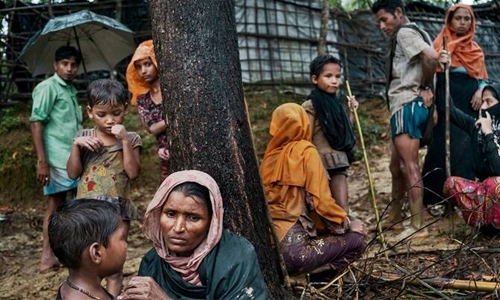15,000 Myanmar nationals crossed into India since Feb 1 coup: UN
PTI | United Nations
The Daily Tribune – www.newsofbahrain.com
More than 15,000 people from Myanmar are estimated to have crossed the border into India since the February 1 military coup there, UN chief Antonio Guterres has said, telling the General Assembly in a report that armed clashes have erupted mostly in regions and states along the borders with Thailand, China and India and are raising concern about regional implications of the crisis.
Guterres, in his report ‘Situation of human rights of Rohingya Muslims and other minorities in Myanmar’, said that prior to February 1, there were around 336,000 internally displaced persons in conflict-affected areas across Myanmar.
“Since that date, more than 220,000 people have been internally displaced by the escalation of conflict and violence. In addition, more than 15,000 people are estimated to have crossed the border into India. A further 7,000 people crossed into Thailand, all of whom have returned and remain internally displaced in Myanmar,” the Secretary-General said in the report, which covers the period from August 15, 2020 to August 14, 2021.
Myanmar shares an over 1,600 km long unfenced and porous land border with India as well as a maritime boundary in the Bay of Bengal. Four North-Eastern states — Arunachal Pradesh, Nagaland, Manipur and Mizoram share the international boundary with Myanmar.
Guterres said in the report that since February, tensions have increased throughout the country, including in areas covered by the 2015 Nationwide Ceasefire Agreement and where there was relative peace before February 1, when the Myanmar military seized power and detained top political figures, including Aung San Suu Kyi and President U Win Myint.
“Mostly in states and regions along the borders with Thailand, China and India, armed clashes have erupted between the Tatmadaw, ethnic armed organisations and newly formed civilian people’s defence forces, raising concern about regional implications of the crisis and the potential for a large-scale armed conflict,” the report said.
The UN chief notes in the report that Rohingya continue to undertake risky journeys across the Bay of Bengal and the Andaman Sea.
“In June, a boat carrying dozens of Rohingya refugees reached Aceh, Indonesia, after leaving Bangladesh or Myanmar — engine failure caused it to remain adrift in the Andaman Sea for several months, leading to the deaths of some refugees. Another boat was rescued by the Indian Coast Guard in February,” he said.
The report added that brutality by the security forces against people opposing the military takeover and the self-declared State Administrative Council, including those participating in the civil disobedience movement, has been wide-ranging.
“Those expressing opposition to the military and joining democratic movements, as well as their relatives and associates, have been subject to arbitrary killings and detentions, disappearances, night raids, intimidation, and torture,” it said.
There have also been numerous reports of sexual and gender-based violence perpetrated by the security forces as well as numerous reports of acts of violence targeted at the security forces, such as the killing of individuals suspected of collaborating with the military.
“The Secretary-General has called for maximum restraint by all sides,” the report said.
Guterres said he has repeatedly called on the military to respect the will of the people, to refrain from violence and repression, and to act in the greater interest of peace and stability in the country.
The UN Security Council has expressed deep concern at the arbitrary detention of members of the Government, including President Win Myint, State Counsellor Aung San Suu Kyi and others, and called for the immediate release of all those detained arbitrarily, while condemning the ongoing violence.
“Neighbouring countries could leverage their influence over the military and call on it to respect the will of the people and to act in the greater interest of peace and stability in the country and region,” he said.
Guterres voiced concern that Myanmar is facing a prolonged period of insecurity and instability and it is important that concerted efforts are made among domestic, regional and international actors to enable fully civilian rule in line with the will of the people.
“The risk of a large-scale armed conflict requires a collective approach to prevent a multi-dimensional catastrophe in the heart of South-East Asia and beyond,” he said.
“Grave humanitarian implications, including rapidly deteriorating food security, an increase in mass displacements and a weakened public health system compounded by a new wave of Covid19 infections require a coordinated approach in complementarity with regional actors,” Guterres said.
He said that the United Nations will focus its efforts on further strengthening a system-wide coherent approach to providing humanitarian and life-saving assistance to support the people of Myanmar and help to prevent further regional ramifications.
UN High Commissioner for Human Rights Michelle Bachelet had said last week that more than 1,120 people have been killed since the coup and military authorities have also arrested over 8,000 people, including elected officials, protesters and journalists during arrests and raids.
At least 120 people have reportedly died in custody, and some have been denied access to medical treatment, she said.
Related Posts

